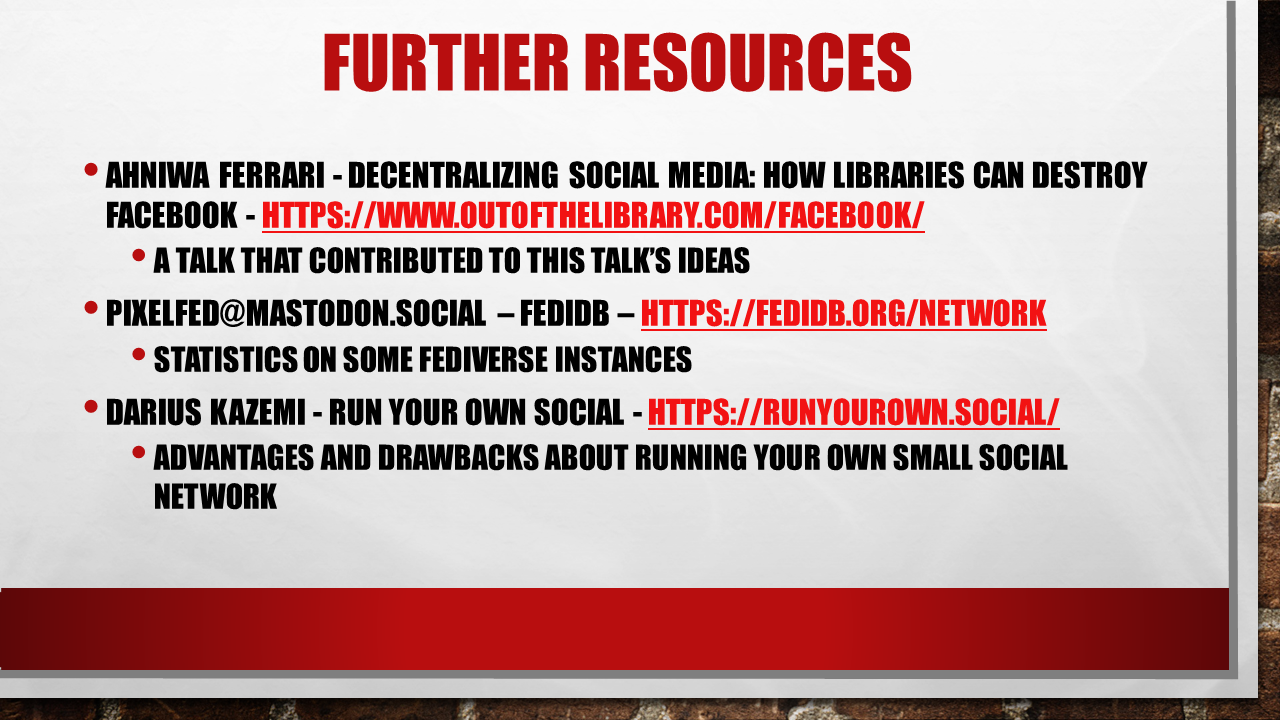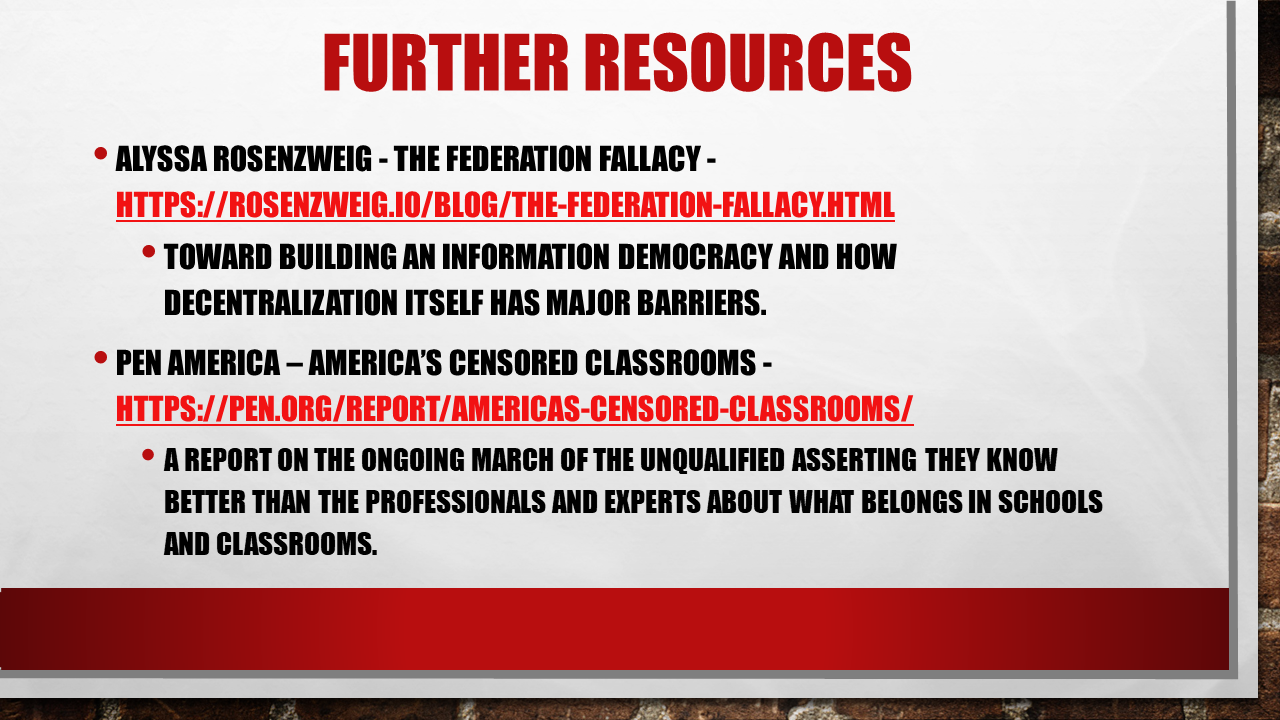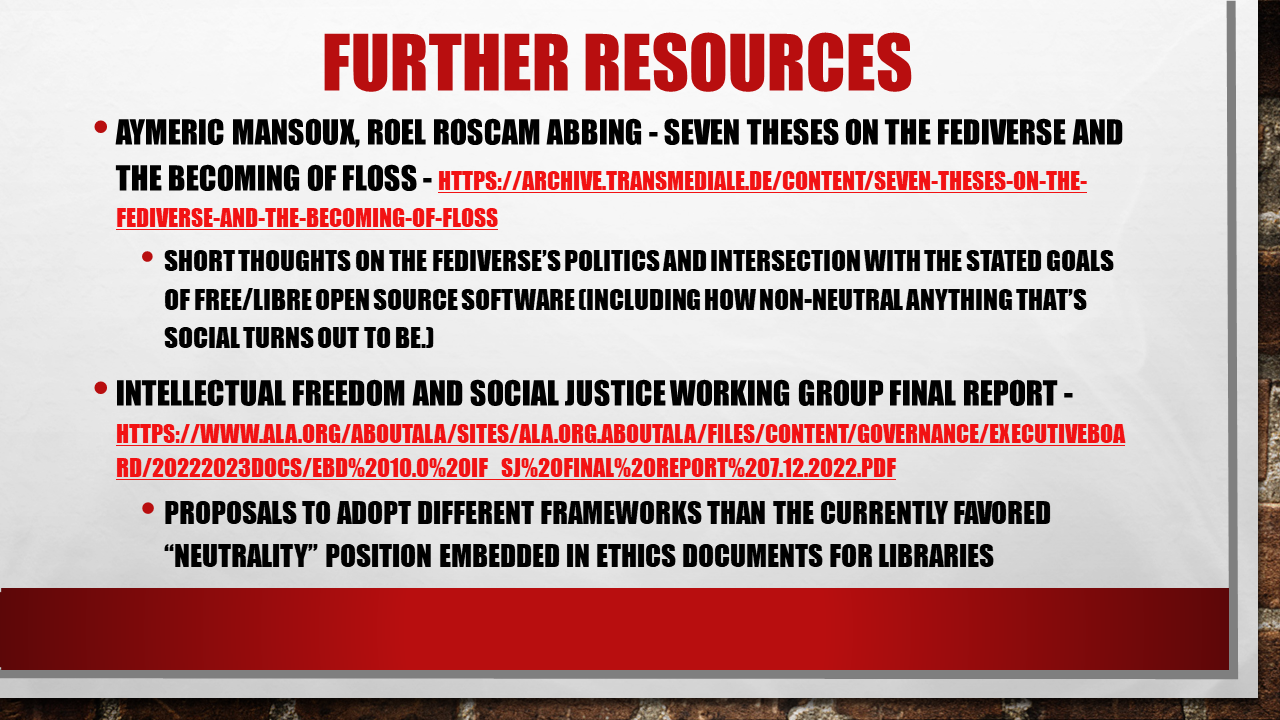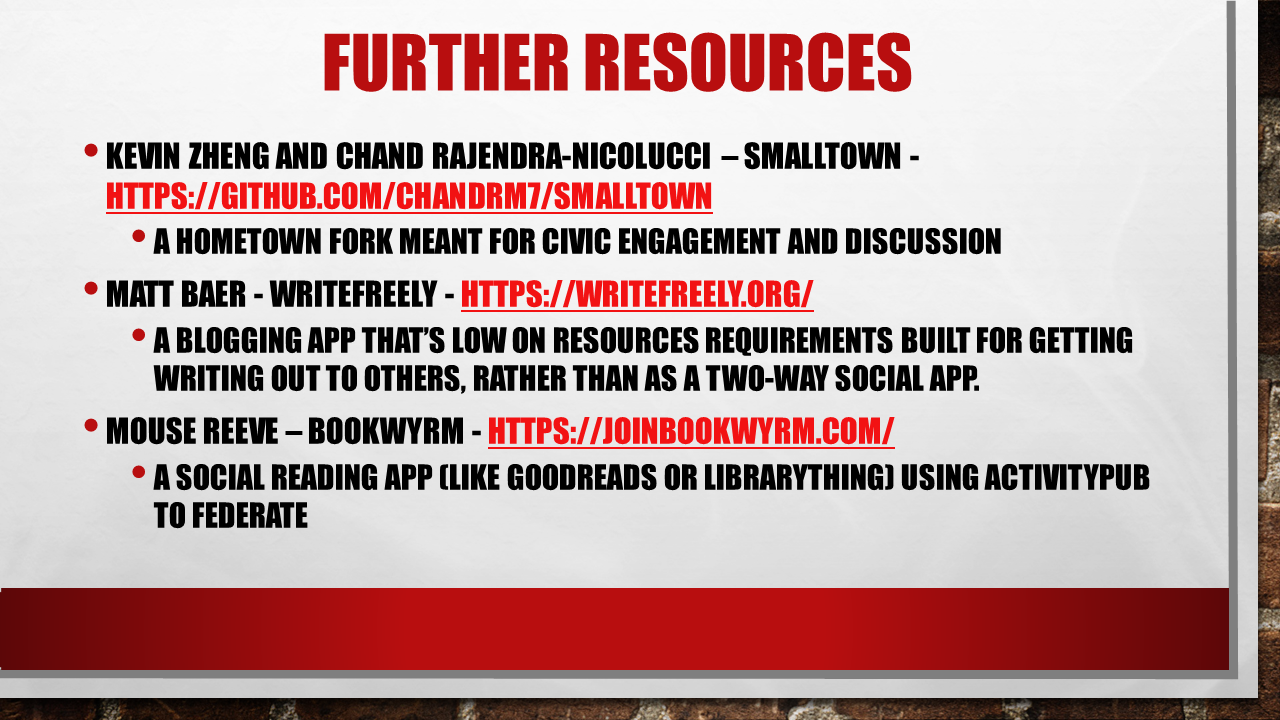Questions and Answers
- Q: As the spouse of a librarian, it's my experience that the majority of public libraries do not actually have strong IT resources, but instead outsource most of their IT to contract companies who specialize in this market. Have you considered targeting this pool of contractors, instead?
- A: That would certainly work. If a library is already paying a company to do much of their IT work and hosting, I'm pretty sure those companies would be more than happy to learn how to and spin up some Fediverse nodes if the library asks them to and pays them to do it. Or, if a library already outsources its own IT to other providers, then they could take advantage of the current crop of hosting providers and pay them to do the instance hosting and technical administration. It's a question of budgets and priorities.
- Q: It's clear what the benefit of this is for Fediverse users. However, how does hosting nodes fit within the mission of the library? How do you make a case for it in therms that will support staffing and budget?
- A: I made much of the case for libraries to adopt in the A-Side of this presentation, but the short answer is that libraries are looking for things they can do for their localities and communities, and they're interested, at least in theory, in keeping people's data and browsing private, so offering alternatives where people can still do things and not have to give up their data to a company to harvest should be something they're interested in exploring and adopting.
- Follow-up Q: Most libraries feel that their responsibility to provide digital resources stops with providing generic reservable computer terminals. Making the case that they should provide a social network requires making the case that they should provide online services at all (except for borrowing books).
- A: In my personal opinion, I believe the position of libraries as warehouses is unteneable, and that libraries that provide services to their communities will ultimately come out ahead, both in public opinion polls but also in elections when funding comes to call. For example, in some very rural areas, libraries have adopted use of empty space in between television channel broadcasts to provide wireless Internet services, since the library is often the place with the biggest and most stable pipeline in the community. It would be a very different community if someone could go to any city park or town park and get free library-provided WiFi while they were there using TV whitespace. [The library would still need to think about what services they wanted to provide and see if it was in the mission of the library, but I feel like the library could do a lot better about offering services that are important and local to their communities.]
- Q: The current state of Fedivese apps is "Needs UX work." Given the low technical aptitude of the average library patron, wouldn't such an effort also require funding an effort to create a UI targeting novice users?
- A: Absolutely, and that sounds like the kind of thing to apply for a local grant for. There may be community foundations that would be willing to fund developer time to create better UX for a platform that can both be used by the library that funds it and contributed back to the codebase for others to use and make their own instances more user-friendly as well. It might not be something that can be funded out of the library's budget, but getting the library and/or its foundation to help with finding and writing a grant applicaiton for UX improvements would make a stronger case for it getting funded.
- Q: Did you mention BookWyrm for local book clubs? If you've looked at it, are there any features you think it's lacking?
- [The slide of the various services was displayed during the talk, but for time reasons, explanations of what those services were and how they might fit into library work was cut.] A: Yes, I think Bookwyrm would be great for local book clubs. A thing that I think is missing from it right now is the inability to import records from local library collections, rather than having to painstakingly code in any new books by hand. [For clarity, Bookwyrm does have databases, including the Internet Archive's OpenLibrary, that a book's metadata can be imported from, so there's a good chance that most books can be added to an instance with an import. It would be even better if it isn't available in OpenLibrary or Inventaire, that someone could say "Hey, who's your local library?" and then be able to search their catalog for the metadata and import it. That's not very easy, however, because public libararies and academic libraries both have very different systems. You could proooooobably put in something like Z39.50 or try to implement SRU/SRW using CQL in Bookwyrm, but that's the kind of thing where I would want someone who knows what they're doing to help, and probably an XML->JSON parser or similar "format this in something that's easier to manipulate and retrieve" happening behind the scenes so that what comes back to the person making the query is something that's ready and able to be imported if it turns out to be what they're looking for. And that's on the assumption, of course, that the people who sold the library the records don't cry foul that those records are Intellectual Property and aren't licensed for reuse in someone else's project. All of this didn't get included because I had thirty seconds left before the end of the Questions and Answers section.]




The whole "The Fediverse @ Your Library" idea, both A-Side and B-Side, came from Aniwha Ferrari's Out of the Library Talk "Decentralizing Social Media: How Libraries Can Destroy Facebook". The thought of decentralized services was intriguing enough, and Aniwha suggested it as something for the library world to undertake, that I decided to undertake a slightly deeper examination of how libraries might not just be people who use Fediverse services in their personal and professional lives, but whether it would be feasible for libraries to become instance hosts so that others could also join the Fediverse.
The nice thing about hypertexting your presentation is that you can drop links to the places you're pulling from right in the presentation, rather than having to wait until the end for your slides. If you have other resources, or if your library decides to take up the possibility of instance hosting, I will be very interested in all the details, technical and social, as to how it went and how it's going. My contacts on social media are in the bar to the left, but if you find TheyOfHIShirts on glammr.us, you'll be able to get in contact, and possibly get some other means of contact for sendiiing along documents and fuller accounts. Let me know how things go.
It also turns out that there were several other potentially relevant talks to this one at SeaGL in 2022. Bob Murphy gave "A Brief Introduction To The Fediverse", and Ernie Smith's keynote about publishing and choice of platform pointed out many of the benefits (and drawbacks) of being the person who maintains control over your own material. So this presentation and its associated everything is always one voice in a conversation with others in and around the Internet and the library world. I think of these presentations as springboards to get people into the greater conversation, and I hope to continue that conversation with all of you into the future. Thanks for reading!